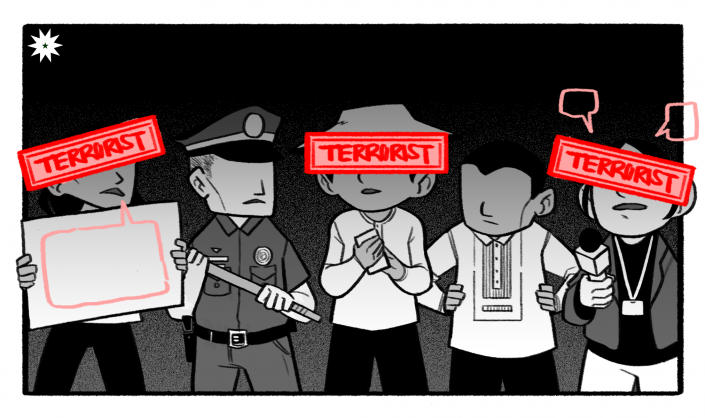As the Philippines’ 122nd day of independence approaches, news of President Rodrigo Duterte certifying House Bill 6875 or the Anti-Terrorism Bill as “urgent”—fast-tracking the Bill’s approval through Congress—last June 1 has once again raised questions as to what our rights are as citizens of the State.
Two days later, it was approved by the House of Representatives on its last reading. As of press time, it now only awaits the President’s signature to become a law.
Though the Bill’s policy aims to “protect life, liberty, and property from terrorism”, its purpose proves to be suspicious. Filipinos have seen Duterte’s administration and its supporters twisting the law in their favor and red-tagging critics for trying to hold him and his allies accountable. It is dubious that this Bill will be any different.
Under the proposed measure, “terrorism” is defined as any act that intends to endanger a person’s life; cause extensive damage to facilities and properties; interfere with systems that will lead to the weakening of national defense and security, national economy, public health, and administration of justice; and allow the possession of weapons and the release of dangerous substances—when any of these are meant to intimidate the public, provoke the government, destabilize social structures, or cause public emergency. While this may seem to limit the scope of the definition, it sneaks in a crucial and potentially dangerous factor—intent, not in and of itself, but who gets to determine it.
Since the existence of any intent must be decided on by a trier of fact such as a court of law, the threat posed above becomes especially manifest when considering that the Bill allows for warrantless arrests. This could mean that if a law enforcement officer “reasonably” perceives someone has intent to commit acts of terrorism, it would be sufficient basis to take the accused into custody without even needing to first prove that person’s intentions in court.
Likewise, because the Bill allows for the purpose of an act to be interpreted through context, there is a greater possibility that innocent actions can be misconstrued as terroristic, further questioning the reliability of warrantless arrests.
This can be particularly worrying for the government’s critics—not just activists, but anyone who voices out their grievances in general. Although forms of protest and dissent are explicitly listed as not being acts of terrorism, the extent to which these are protected once again relies on their intent. However, the provision criminalizing “inciting to commit terrorism” implicates that while the said acts may not be terroristic, persons can still be punished for supposedly influencing others to commit terrorism. More dangerously, the Bill finds that mere speeches and writings can be grounds for such an accusation.
Privacy, too, will be completely disregarded; secretly wiretapping private devices, conversations, and messages on different platforms will be legal and constitutional so long as the Court of Appeals finds probable cause for anyone—or everyone—to be a terrorist.
Even the administration’s supporters grow more powerful, with red-tagging suddenly becoming a direr act. They could brand an individual with mere words, allowing the government’s judgment to potentially fall unto them—like vultures circling prey, signaling other predators to intercept. It is because of such wrongful allegations that different sectors of the University of the Philippines had to issue statements to address the red-tagging of their students in the past. Moreover, death threats and other malicious warnings often accompanied these actions. With the Bill, these threats rise in magnitude, with the government now able to take the accuser’s side.
While these issues already make the proposed measure itself problematic in nature, the political climate under which it is to become law presents a cause for more concern. Its timing is nothing more than cunning, considering that every Juan Dela Cruz is simply striving to get by each day—and by any means.
Our basic rights—including various forms of freedom—as citizens of the country will be stripped once this Bill is implemented. More than what it is made to look like, its approval means institutionalizing the instilling of malice in any gathering, conversation, and action of people that this administration deems threatening to their power and jurisdiction.
As if intentionally incriminating innocents in this administration’s war against drugs did not already forsake human rights, it seems that more Filipinos will have to prepare themselves to be framed as enemies of the Republic.

